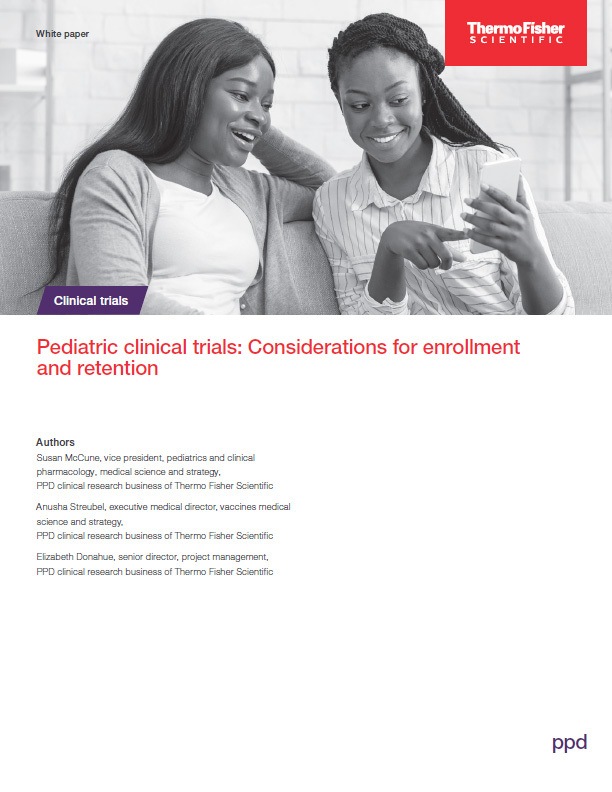
Pediatric Research
Advancing the development of safe and effective therapies for children
There’s much more to pediatric research than just operating clinical trials. Like you, we’re committed to taking extraordinary measures to improve the lives of children and help their families navigate a time of great uncertainty. Our patient-centric digital and decentralized solutions are designed to not only ensure study effectiveness, but to also remove barriers that families can face when trying to access and participate in pediatric clinical trials.
Your success is built on a foundation that combines an intimate awareness of the unique needs of infants, children and adolescents participating in clinical studies with the world-class scientific acumen required to bring therapies from concept to clinic.
Our Rare Disease and Pediatric Center of Excellence (COE) provides dedicated, cross-functional resources focused on rare and pediatric trial design, strategy and delivery. This COE offers strategic insights across all therapeutic disciplines to inform and optimize clinical and regulatory strategy development, ultimately accelerating the delivery of treatments to millions of children worldwide.
Maximize your success in pediatric trials with unmatched pediatric expertise
End-to-end pediatric capabilities
Pediatric studies at all stages of development require a broad range of contract research organization (CRO) services.
Our expertise includes:
- Global experience: We conduct clinical development in more than 100 countries, bringing insight into protocol development, feasibility and study design based on a knowledge of current standard of care and regulatory trends
- Focus on efficiency: In an effort to streamline operations in global clinical trials, we consult with internal and external clinical teams on pediatric product development. These multidisciplinary teams have firsthand knowledge of the challenges and risk mitigation strategies necessary to address consent and assent, recruitment, and retention.
- High-quality site identification: We start by finding qualified and experienced pediatric sites, then consult with those sites on the appropriate regulatory structures and processes, including continued support throughout the study.
- Accessing the right talent: Our teams bring in investigators with relevant pediatric expertise to ensure your study is supported by staff with experience working on trials like yours.
- Regulatory compliance: We participate in pediatric regulatory activities to develop and execute global regulatory strategies and dossier preparation.
Pediatric experience in the past five years
Pediatric studies performed across 100+ countries
Global pediatric clinical study patients enrolled
Globally contracted sites
Unique considerations in pediatric clinical research


Pediatric clinical trials: Considerations for enrollment and retention
Clinical trials enrolling pediatric patients have unique considerations due to the differences in physiology between children and adults, as well as differences across the spectrum of pediatric age groups. Successful trial execution requires adjustments to trial designs and communication, as well as a patient-centric approach. Learn how our dedicated pediatric experts can efficiently address regulatory and ethical requirements, ensure the capture of high-quality endpoint data, and maximize recruitment and retention in pediatric clinical trials.
A global presence with local pediatrics expertise
Extensive Pediatric Investigator Network
A strong investigator network is vital to your rare pediatric program’s success. Our Pediatric Investigator Network (PIN) consists of 23 relationships encompassing 46 hospitals around the globe. Further, the PIN includes four therapeutically aligned networks designed to optimize the development of therapies for childhood diseases. Our PIN partnerships provide direct access to pediatric thought leaders and principal investigators across relevant therapeutic areas, facilitating rapid feasibility and protocol input to develop clinical trials that are practical and operationally sound for children. These research-experienced sites also serve as key centers to support the evaluation of new pediatric medicines.

Industry leader in pediatric research
When it comes to pediatric research, you need an experienced team that can execute bespoke, end-to-end strategic and support services in a compassionate, patient-first manner. We leverage our expertise to positively change the trajectory of pediatric diseases and the lives of the people affected by them. By providing support and consultation to internal study teams during clinical trials, we enable continuity of operational execution at critical points in the development of pediatric treatments.
The COE prioritizes the needs of children and their families. We combine the accessibility and specialized expertise as a provider of CRO solutions with our worldwide footprint with decades of experience to address strategic, operational, medical and scientific challenges presented by small, widely dispersed patient populations across the globe.

Active support for pediatric clinical trials participants and their caregivers
Being part of a pediatric clinical trial can be a significant and complex undertaking, compounded by the realities of living with these diseases. Our team enables you to compassionately support these young patients and their families with concierge services, which help them manage clinical requirements and navigate complex trial logistics.
Each experienced concierge provides a collaborative environment where patients, providers and caregivers can establish a personal connection that informs protocol design and identifies potential barriers to patient participation and retention. We take a proactive approach to help patients and their caregivers resolve logistical issues by supporting them with: appointment reminders, transportation coordination and booking, reimbursement, home health care and telehealth visits. Services are provided in several languages to foster a personal connection and offer stability in what can often feel like a time of upheaval.
Innovative, patient-centric solutions inspire participation and help reach, recruit, and retain small, globally dispersed populations.
These solutions include:

- Patient-centered research conducted by our Evidera peri- and post-approval business to evaluate patient, clinician, and caregiver outcomes, utilities, and preferences
- Engagement with patient advocacy groups
- Active solicitation of feedback from patients, their caregivers and site staff to understand patients’ experiences and incorporate them into improving future clinical trial design and execution
- Establishment of critical site-patient connections
- Full-service booking and coordination of patient transportation to and from study sites that provide convenience for patients and travel expense verification
- Flexible options for patient reimbursement in more than 150 currencies
- Home health care options, including partnering with remote staff
- Connection to flexible protocols for digital and decentralized trials and hybrid approaches using mobile pages, wearables, telehealth and e-consent